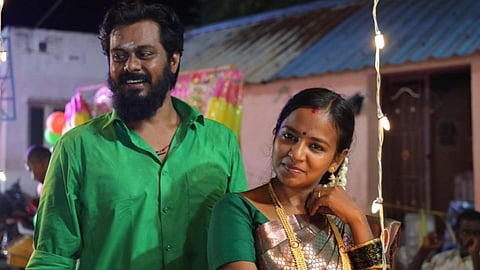Veppam Kulir Mazhai Movie Review: Strong performances hold this rural drama on pregnancy taboos
Veppam Kulir Mazhai(3 / 5)
A film about infertility, delayed pregnancy, and the stigma around it couldn't have come at a better time; when Chennai has become an undeclared hub of IVF treatment. Even though Veppam Kulir Mazhai doesn't focus heavily on the science behind IVF, it has scored well in emotions and lays bare some basic truths.
Director: Pascal Vedamuthu
Cast: Dhirav, Ismath Banu, MS Bhaskar, Dev Habibullah, Rama
The story of Petha Perumal (Dhirav) and Pandi (Ismath Banu) unfolds in Maviduthikottai village in Devakottai. The villagers are obsessed with the couple's struggle to become parents. From taking away the village temple's first respect to having a child being viewed as a matter of pride by Perumal's mother (Rama), their pregnancy affects their social status in the village and is a constant topic of discussion among the villagers.
Instead of being a matter of personal desire between the couples, their pregnancy becomes a social necessity. How, or whether, Petha and Pandi stay together in the face of derision, and how far they go to bear an offspring, is what Veppam Kulir Mazhai is all about.
Director Pascal Vedamuthu wins big with designing the characters and his casting choices. Petha Perumal plays a man with ample amounts of male ego. When his wife suggests that he marry another girl so he can have a child, he hesitantly agrees but scoffs at the idea of IVF. Pandi, on the other hand, feels the full brunt of the social pressure. If the dishes aren't done well or if clothes don't get dried, the words "you don't have a child, can you not at least do this" is heard on repeat. When Petha hears his wife is expecting, instead of hugging or kissing her, he sits down and does a thigh-slap and twirls his moustache. This is his idea of fatherhood. He wants to stay clear of the tag 'impotent', but doesn't sufficiently defend his wife when she gets called the same. Then there is Petha's mother who seeks divine but not medical intervention to become a grandmother. Pascal keeps underlining the regressive idea the village carries about parenthood both subtly and ostensibly.
While Ismath Banu's Pandi remains a mature character stuck among simpletons throughout the run-time, the situations that cause a change of heart in Petha and Pottu Amma (Rama), make them particularly endearing. The portrayal of Petha's regret and how Pottu Amma encourages Pandi to be assertive, are some of the best sequences in the film, where the drama is convincing and the emotional arcs are well-rounded.
On the other hand, a strong performer like MS Bhaskar has been terribly underused. The chronological inaccuracy is also palpable. Dev Habibullah's Gandhi, who is built up as Petha's nemesis, just vanishes. It is strongly conveyed that the collective perceptions and regressive ideologies are the villains, instead of any particular individual. This is exactly why it feels redundant to spend a lot of time developing antagonists instead of focusing on the primary problem. The background score feels jarring for most of the film. However, with the song 'Eppo Eppo' the emotional state of the characters is communicated well.
Cinematographer Prithvi Rajendran brings out the liveliness of the rural setting, especially in the Thiruvizha scenes while Dhirav has handled the cuts neatly. Debut director Pascal Vedama has successfully walked a tightrope in how he embraces natural parenthood while also not vilifying IVF treatment and portraying the societal pressure faced by newly wed couples through an empathetic lens.

